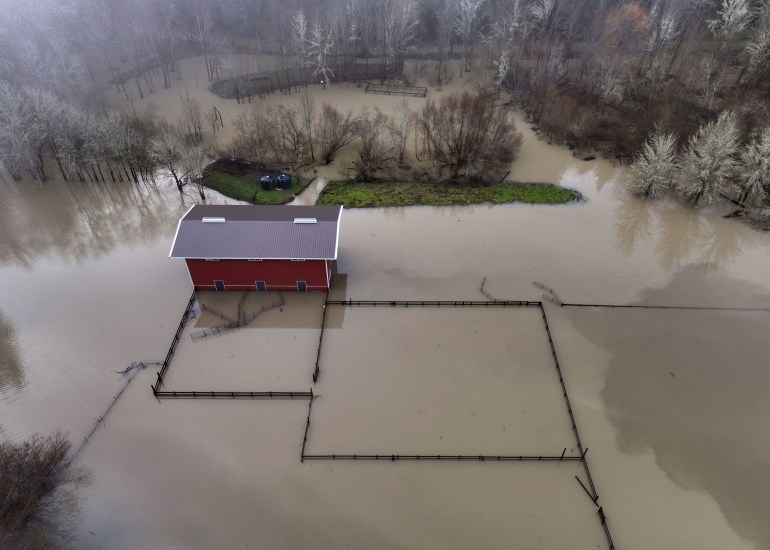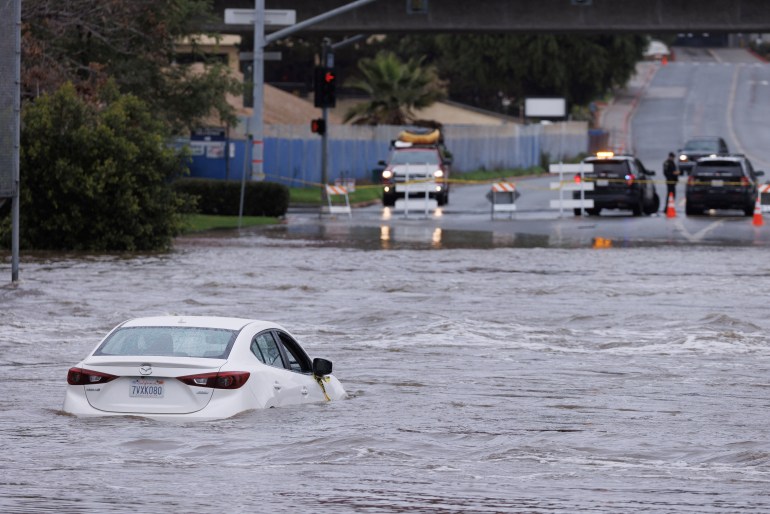As the west coast of the United States withstands its ninth major storm in three weeks, California Governor Gavin Newsom has signed a new executive order to “further bolster the emergency response” as his state contends with widespread flooding and mudslides.
In a statement on Monday, Newsom’s office said that the onslaught of atmospheric rivers — relatively intense, narrow bands of moisture that can bring heavy precipitation and strong gusts — “resulted in at least 20 fatalities and forced the evacuation of tens of thousands of residents”.
The latest executive order comes two days after US President Joe Biden declared the situation in California “a major disaster” and ordered additional federal aid for the waterlogged state.
Cleanup efforts are underway as California continues to endure the effects of the storms, with flood warnings and evacuation orders still in effect for areas including Monterey County, a region famous for its rugged coastline and scenic, cliff-hugging highways.
Lingering showers are expected “through midweek”, according to the governor’s office.
“Even 6 inches [15cm] of fast-moving flood water can knock you off your feet,” the National Weather Service warned on Monday. “And a depth of 2 feet [60cm] will float your car.”
Powerful storms over the weekend flipped a big-rig truck travelling across San Francisco’s iconic Golden Gate Bridge on Saturday and led to roads buckling and crumbling across the state.
Happening now – @SDLifeguards and copter 2 searching for victims in the SD River near 4700 Pacific Hwy. So far 5 victims out of the water with two more possibly still in. #rescues pic.twitter.com/TAonVkTND1
— SDFD (@SDFD) January 16, 2023
In San Diego County, close to the state’s border with Mexico, the Los Angeles Times reported that at least nine people were rescued from fast-moving water resulting from the continuous rainfall.
And even as precipitation tapered off on Monday in some parts of the state, loose soil — brittle from a years-long drought and saturated from three straight weeks of rain — continues to pose a threat.
Mudslides forced 10 homes in Berkeley Hills in northern California to be evacuated on Monday morning. And in southern California, more rock, mud and debris poured onto state highways in Los Angeles and Ventura counties, forcing further delays in areas already stalled by collapsing hillsides over the weekend.

High in the Sierra Nevada mountains that form the state’s eastern rim, the Central Sierra Snow Lab run by the University of California, Berkeley, reports that its research station has received 126cm (49.6 inches) of snow since Friday, with more falling on Monday.
The lab had previously documented that the snowpack around its research centre was approximately 3 metres (10 feet) deep as of Saturday.
The National Weather Service has issued a “winter storm warning” for the mountains through Tuesday, predicting most of the snowfall will happen on Monday.
“Travel will be extremely difficult or impossible. If you plan to travel, consider alternate strategies,” the agency’s bureau in Hanford tweeted.
White-out conditions in the mountains had previously forced the closure of Interstate 80, a major east-west artery, over the weekend. But traffic over the Sierra Nevada resumed on Monday, with cars required to use tyre chains to navigate the snow and ice.
Other roadways remain closed “due to heavy snow [and] avalanche control”, the state transportation authority Caltrans tweeted.
While nearby Santa Cruz and Monterey counties continued to face flood warnings, the city of San Francisco and other municipalities in the north and east of the San Francisco Bay Area started to see drier conditions on Monday after a soggy morning.
The overnight rainfall in San Francisco pushed the total precipitation since October to 516mm (20.3 inches), surpassing the yearly average in a matter of months, according to the National Weather Service.
Federal disaster relief is available for hard-hit counties like Santa Cruz, Sacramento and Merced, where the small agricultural town of Planada was largely submerged by floodwaters.
“All of this was underwater,” local activist Alicia Rodriguez told the Merced Sun-Star newspaper as she made visits to a residential neighbourhood last week. “A resident was telling me it was 4 feet [1.2 metres] in some places.”

Monday’s executive order from the governor’s office has called for state agencies to waive their fees for residents seeking to replace vital records, like birth certificates, and it provides resources for health care facilities to remain open during the severe weather.
The California National Guard reported on Sunday that its 649th Engineer Company had removed 1,800 cubic yards (1376 cubic metres) of debris from San Ysidro Creek alone, “enough to cover an entire football field in 12 inches [30cm] of debris”.
“And they’re just getting started,” the National Guard said in a tweet.
Meteorologists continue to monitor a developing storm over the Pacific Ocean to see if it will become a 10th atmospheric river. It is expected to make landfall on Wednesday.


